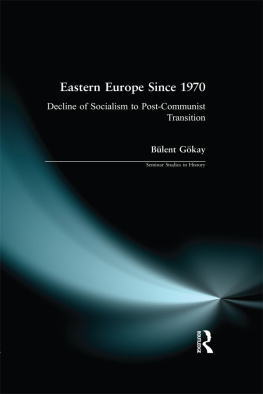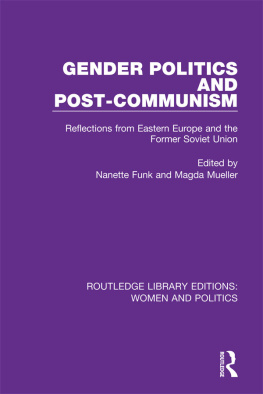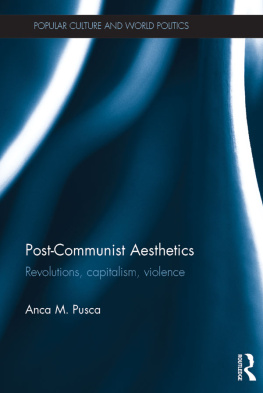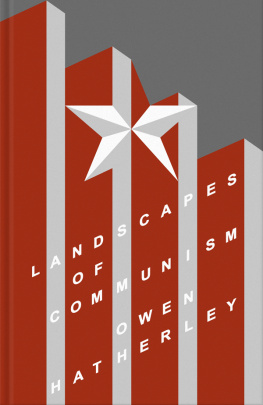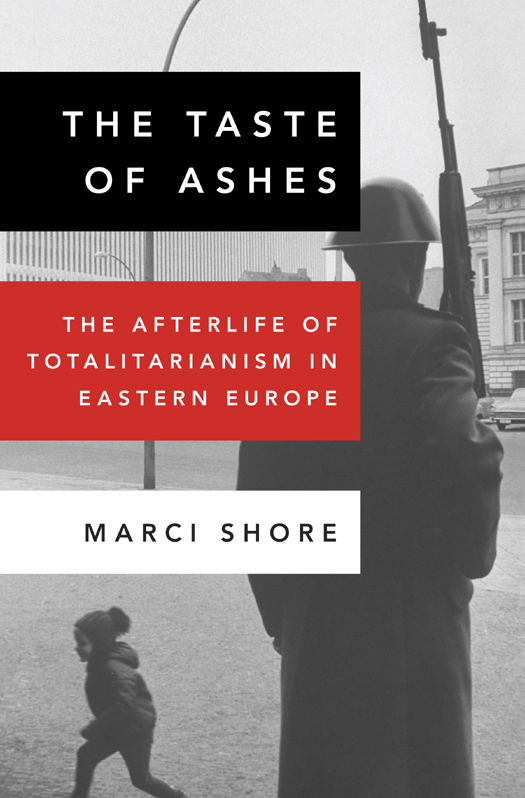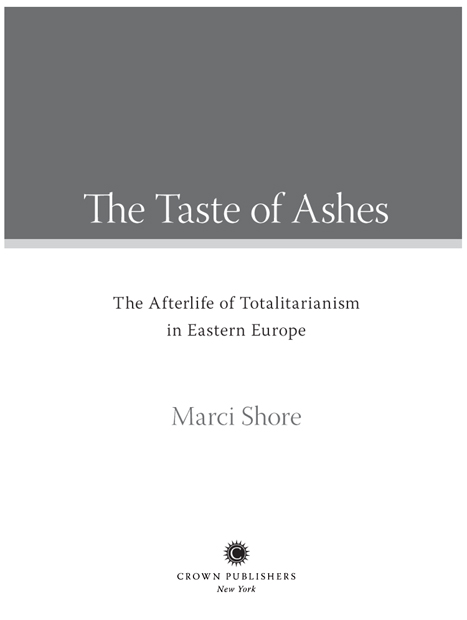Copyright 2013 by Marci Shore
All rights reserved.
Published in the United States by Crown Publishers, an imprint of the Crown Publishing Group, a division of Random House, Inc., New York.
www.crownpublishing.com
CROWN and the Crown colophon are registered trademarks of Random House, Inc.
Library of Congress Cataloging-in-Publication Data
Shore, Marci.
The taste of ashes : the afterlife of totalitarianism in Eastern Europe / Marci Shore.1st ed.
p. cm.
1. Europe, EasternSocial conditions1989 2. Post-communismEurope, Eastern. 3. Social changeEurope, Eastern. 4. Social psychologyEurope, Eastern. 5. Shore, MarciTravelEurope, Eastern. I. Title.
HN380.7.A8S56 2012
303.40947dc23
2012007853
eISBN: 978-0-307-88883-9
Jacket design by Eric White
Jacket photograph: Ralph Crane/Time & Life Pictures/Getty Images
v3.1
Timuszkowi
CONTENTS

AUTHORS NOTE

This is a work of nonfiction. I have, however, changed the names (and in a single case an identifying profession) of many of the books protagonists who are not public figures, in an effort to protect their privacy. A further note: because this book includes many citations from a variety of spoken and written sources, in the interest of clarity I have put quotations from oral sources in quotation marks and quotations from written sources in italics.
PREFACE

E astern Europe is special. It is Europe, only more so. It is a place where people live and die, only more so. In these lands between the West and Russia, the past is palpable, and heavy. The past is also merciless: by historys caprice, here the Second World War and communism were inseparable historical traumas, one bleeding into the other, as Nazi power gave way to Soviet domination.
I came to Eastern Europe for the first time in 1993, knowing almost nothing. The previous summer, at the carnivalesque parking lot of a Grateful Dead concert in Northern California, I had sat on the grass amid the Deadheads, who were braiding hair, selling bagels, and smoking marijuana, and read Vclav Havels essays, the essays that had originally been published secretly, in samizdat editions. I was mesmerized by the romance of the Velvet Revolution, seemingly so untainted, and by the imprisoned playwright who became a philosopher-president, who went to live in a magnificent castle, and who made Frank Zappa one of his advisers. Havel seemed so generous, so loving toward the world, so good.
I came to Eastern Europe because I wanted to hear a story that ended happily. I wanted to learn how the philosophers came to power and the people were liberated. I wanted to understand the anticommunist dissidents of the 1970s and 1980s, who had been unafraid to speak truth to power. Yet I found myself drawn into an ever more distant past: to understand the dissidents I needed to understand the Marxist revisionists calling for a more democratic socialism who preceded them; to understand the Marxist revisionists of the 1960s I needed to understand the Stalinists of the 1950s; to understand Stalinism I needed to understand the Second World War and the Holocaust; to understand the war I needed to understand the depression and fascism of the 1930s and the unhinging, the dizzying possibilities, of the 1920s. And so while this book moves forward in time from the early 1990s through the second postcommunist decade, it also moves backward in time, from the 1980s to the years immediately following the First World War. The pivot is the revolutions of 1989, which ended communism and brought me to Europe.
All historical drama is acted through the lives of individuals. The postcommunist moment that followed the revolutions of 1989 was a moment of disorienting freedom: spaces suddenly opened for people to play new roles. They could find themselves inadvertently, as if by accident, in positions of power. The postcommunist moment was also one of generational estrangement: in 1989 age suddenly mattered very much. From its nineteenth-century beginning, communism had always been a generational history, a Freudian family romance, each generation killing the fathers in its turn. The fall of communism did not end the silences of ones parents or resolve the feelings of guilt by contiguity with the crimes of earlier generations; it rather heightened demands for accounting with the past. This desire for accounting raised disquieting questions: Could the boundary between public and private, nearly effaced by totalitarianism, be restored? Could the intimate and the political be disentangled? The eclipsing of private space was among totalitarianisms deepest violations. In this way the totalitarian state was unlike its merely authoritarian or monarchical predecessors: it distinguished itselfit made itselfby caring what lovers said in bed. Was it possible to restore human dignity through truth, if arriving at truth involved gazing anew through old peepholes?
Shortly after his defection to the West in 1951, the Polish poet Czesaw Miosz wrote, The man of the East cannot take Americans seriously because they have never undergone the experiences that teach men how relative their judgments and thinking habits are. For half a century, on the eastern half of the European continent, people made decisions, often in extreme moments, most never believing that communism would end in their lifetimes, many never imagining that they would have to account for their choices in a world where all the rules had changed. This book tells a story about the darker side of the fall of communism, about the lingering presence of the past. After 1989 the ability to reinvent oneself was circumscribed: no one, after all, could change his previous life. Freedom meant being liberated, but also exposed. Openness was a key to both a treasure chest of knowledge about the past and a Pandoras box of unanswerable questions. This is a story, too, about the inescapable interplay between historical fate and individual choice. There were historical situations in which no decisions were innocent ones, in which all significant action was a betrayal of someone or something, in which all possible choices caused suffering. Nonetheless one had to choose. In twentieth-century Eastern Europe tragedy was endemic.
The lives of East Europeans after communism reveal the necessity of choice, the omnipresence of guilt, and the impossibility of closure. In the pages that follow these dilemmas are illuminated in large measure through an extreme case: Stalinists and the lives of their children and grandchildren. They are illuminated, too, through the lives of other former dissidents and former Stalinists, poets and politicians, Jews and Gentiles, Zionists and communists, old people and young people, brothers and sisters, husbands and wives, lovers and friends, those who stayed and those who left, those who killed themselves, those who reinvented themselves, and those who live on.



